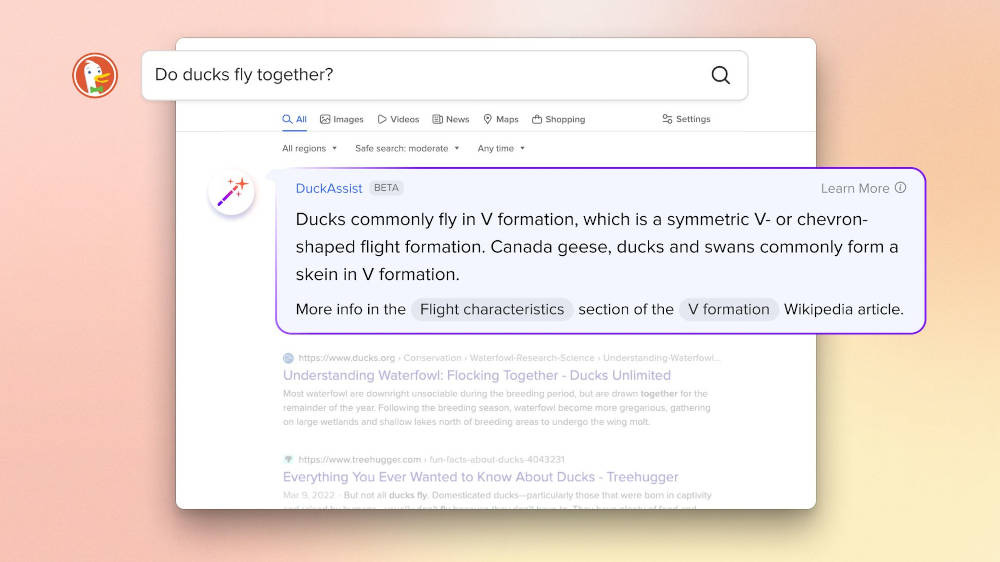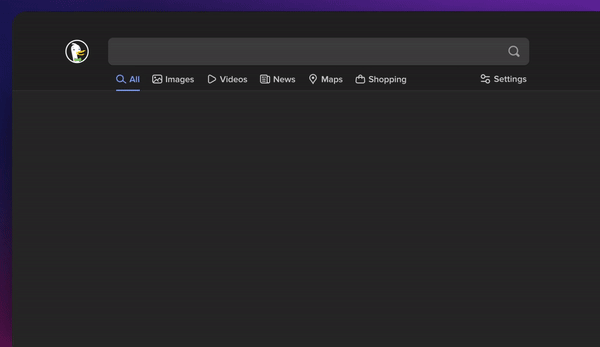DuckDuckGo is the latest search engine to embrace AI
DuckAssist follows in the footsteps of Google's Bard and Microsoft's Bing
Following Microsoft’s AI-powered Bing and Google’s experimental Bard, DuckDuckGo is the latest search engine to embrace the excitement around artificial intelligence with an AI add-on that can generate answers to simple questions in seconds.
Called DuckAssist, the AI engine will automatically scan Wikipedia (and sometimes related encyclopedia sites such as Britannica) to collate the information it finds in a short summary box above a page of regular search results. According to a blog post announcing the new tool, it’s completely free and doesn’t require a login. It’s available now but only in the DuckDuckGo browser extension and mobile app.
➡️ The Shortcut Skinny: PS5 update
🤖 Search engine DuckDuckGo now has an add-on AI tool
💭 DuckAssist automatically generates answers to simple questions
🌐 It scans and summarizes information from Wikipedia
📱 At the moment, it’s only available in DuckDuckGo app and extension
“This is the first in a series of generative AI-assisted features we hope to roll out in the coming months,” reads the post. “We wanted DuckAssist to be the first because we think it can immediately help users find answers to what they are looking for faster. And, if this DuckAssist trial goes well, we will roll it out to all DuckDuckGo search users in the coming weeks.”
DuckAssist is powered by language models built by OpenAI and AI startup Anthropic, and has been designed to more responsively answer basic questions, saving you from having to trawl through web pages to find a pithy answer.
“For this initial trial, DuckAssist is most likely to appear in our search results when users search for questions that have straightforward answers in Wikipedia. Think questions like ‘what is a search engine index?’ rather than more subjective questions like ‘what is the best search engine?’”
The model will draw from information on Wikipedia that is “at most a few weeks old”, so can be used to answer most queries but won’t be of any help with super-timely questions.
DuckDuckGo creator Gabriel Weinberg said DuckAssist is less likely to hallucinate information (i.e. confidently repeat factually incorrect statements) because it only draws from Wikipedia, a single source that is unlikely to contradict itself. All generated answers will be accompanied by a source link, too, which will usually point to a specific section within a Wikipedia article.
“Nonetheless, DuckAssist won’t generate accurate answers all of the time,” Weinberg said. “We fully expect it to make mistakes. Because there’s a limit to the amount of information the feature can summarize, we use the specific sentences in Wikipedia we think are the most relevant; inaccuracies can happen if our relevancy function is off, unintentionally omitting key sentences, or if there’s an underlying error in the source material given.”
He went on to say that while Wikipedia isn’t a perfect source of knowledge, it’s “relatively reliable across a wide variety of subjects” and is frequently updated with new information and facts.
Weinberg will likely be hoping DuckAssist has a better landing than similar search engine AI models of late. Google’s Bard fluffed its first performance and Microsoft’s AI version of Bing didn’t perform much better, generating a heap of inaccuracies.
At least when DuckAssist finally comes to browsers, we won’t have to sign in to anything to actually use it. That makes the prospect of testing out AI search a whole lot rosier.




